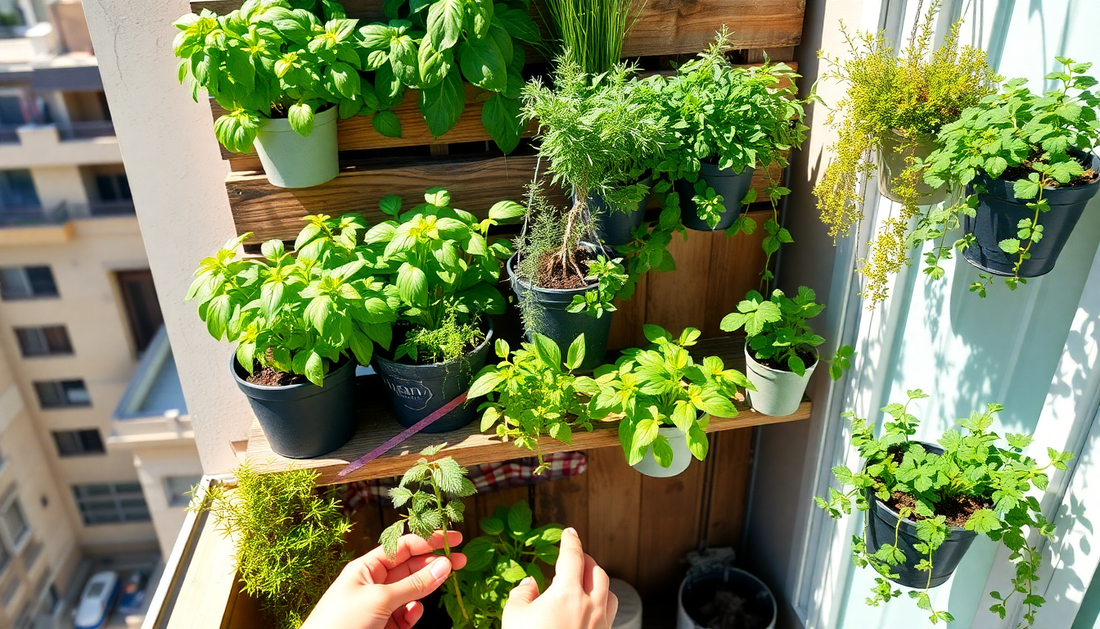
Grow Your Own Herb Garden: A Guide for Small Spaces
In the bustling city of Bangalore, where space is at a premium, many urban dwellers are finding joy in cultivating their own herb gardens, even in the confines of their small apartments. Idyl, a one-stop shop for all your gardening needs, is here to guide you on your journey to growing a thriving herb garden that will not only add a touch of freshness to your cooking but also bring a sense of serenity to your living space.
The Benefits of Growing Herbs at Home
Herbs are not only delightful additions to your culinary creations, but they also offer a wealth of health benefits. From the soothing aroma of fresh basil to the immune-boosting properties of rosemary, incorporating homegrown herbs into your meals can elevate your dining experience and provide a natural source of essential vitamins and minerals.
Moreover, tending to a small herb garden can be a deeply rewarding and therapeutic activity. The act of caring for these fragrant plants can help reduce stress, improve mental well-being, and foster a deeper connection with nature, even in the heart of the city.
Choosing the Right Herbs for Your Space
When it comes to cultivating herbs in a small apartment, it's essential to select varieties that thrive in limited space and require minimal maintenance. Some of the best herbs for small-space gardening include:
Basil
Fragrant and versatile, basil is a must-have for any herb garden. It thrives in bright, sunny spots and can be grown in containers or small planters.
Mint
Refreshing and hardy, mint is a prolific grower that can be easily contained in a pot or planter. It's perfect for adding a burst of flavor to teas, cocktails, and salads.
Rosemary
This aromatic herb not only adds depth to your cooking but also has a calming effect. Rosemary can tolerate partial shade and requires infrequent watering, making it an ideal choice for busy urban gardeners.
Thyme
Compact and resilient, thyme thrives in well-drained soil and can be grown in small pots or window boxes. Its earthy flavor pairs beautifully with a variety of dishes.
Chives
These delicate, onion-flavored herbs are easy to grow and can be snipped directly into your meals, adding a pop of color and flavor.
When selecting your herbs, consider their individual needs, such as sunlight requirements and watering preferences, to ensure they thrive in your specific living environment.
Creating the Perfect Herb Garden
To set up your herb garden for success, follow these simple steps:
Choose the Right Containers
Select containers or planters that are at least 6 inches deep and have adequate drainage holes. This will provide your herbs with the space they need to develop healthy root systems.
Prepare the Soil
Use a high-quality, well-draining potting mix specifically formulated for herbs. Avoid using regular garden soil, as it may be too dense and heavy for container gardening.
Provide Ample Sunlight
Most herbs require at least 6 hours of direct sunlight per day. Position your herb garden in a spot that receives plenty of natural light, such as a sunny windowsill or a balcony.
Water Wisely
Herbs have varying water needs, so it's important to monitor the soil moisture and adjust your watering schedule accordingly. Avoid overwatering, as this can lead to root rot.
Prune and Harvest Regularly
Regular pruning and harvesting will encourage your herbs to grow bushy and productive. Snip off the leaves or stems as needed, leaving at least 2-3 inches of growth to ensure the plant's continued health.
Fertilize Periodically
Apply a balanced, water-soluble fertilizer every 4-6 weeks to replenish the nutrients in the soil and support the growth of your herbs.
By following these simple guidelines, you'll be well on your way to creating a thriving herb garden that will not only enhance your culinary creations but also bring a touch of nature into your urban living space.
Troubleshooting Common Herb Garden Challenges
Even the most experienced gardeners may encounter a few hiccups along the way. Here are some common issues and how to address them:
Wilting or Yellowing Leaves
This could be a sign of over- or under-watering. Adjust your watering schedule and ensure the soil is draining properly.
Pests and Diseases
Keep an eye out for common herb garden pests, such as aphids or spider mites, and treat them promptly with organic pest control methods. Maintain good air circulation and avoid overcrowding to prevent the spread of diseases.
Leggy or Sparse Growth
If your herbs are growing tall and spindly, they may not be receiving enough sunlight. Move your garden to a brighter location or consider supplementing with a grow light.
Slow Growth
Herbs may need a boost of nutrients. Apply a balanced fertilizer and ensure the soil is well-draining and aerated.
By addressing these challenges proactively, you can keep your herb garden thriving and enjoy the fresh, flavorful rewards of your hard work.
Expanding Your Herb Garden
As your confidence and experience in herb gardening grow, you may find yourself eager to expand your collection. Idyl offers a wide range of herbs, as well as gardening services and bulk order discounts, to help you create the herb garden of your dreams.
Whether you're a seasoned green thumb or a beginner just starting your urban gardening journey, Idyl is here to support you every step of the way. Embrace the joy of cultivating your own herb garden and unlock a world of culinary and wellness benefits right in the comfort of your own home.
Happy gardening!







No comments